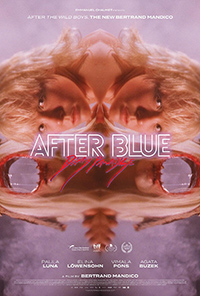Taste of a Toxic Paradise: Mandico Casts a Dark Spell with Broody Sci-Fi
 Through a variety of short films, music videos (including several for M83), and his 2017 feature film, The Wild Boys, Bertrand Mandico fills a transgressive void in his dazzling mutations of arthouse queer aesthetics. Pushing boundaries of sexuality and gender through narrative themes and visual metaphors, his sophomore film After Blue is revisionist Western masquerading as vintage sci-fi, like hallucinogenic Heinlein meets femme-centric Ballard. An ambitious palette dwindles into a trance-inducing odyssey through a strange world’s poisonous hinterlands, where trippy vibes are broken up only by odd jabs of titillation and unfurling desires. As strange and unexpected as any of Mandico’s previous offerings, it’s another visionary exercise of queer energies and ominous passion.
Through a variety of short films, music videos (including several for M83), and his 2017 feature film, The Wild Boys, Bertrand Mandico fills a transgressive void in his dazzling mutations of arthouse queer aesthetics. Pushing boundaries of sexuality and gender through narrative themes and visual metaphors, his sophomore film After Blue is revisionist Western masquerading as vintage sci-fi, like hallucinogenic Heinlein meets femme-centric Ballard. An ambitious palette dwindles into a trance-inducing odyssey through a strange world’s poisonous hinterlands, where trippy vibes are broken up only by odd jabs of titillation and unfurling desires. As strange and unexpected as any of Mandico’s previous offerings, it’s another visionary exercise of queer energies and ominous passion.
The original French title, After Blue (Paradis sale) is arguably a better fit than After Blue, the name of the planet upon which women folk have been able to abscond following the deterioration of Earth. Paula Luna’s Roxy (nicknamed Toxic by her peers) narrates her tale to an unknown woman intensely interested in her experiences and how she came to be. Men are unable to survive on the planet, only “ovarian-bearing” beings are able to withstand the atmosphere, which causes the inhabitants to generate hirsute necks, and men’s hair grows “inwards,” necessitating their death. The women are able to inseminate themselves with sperm transported from Earth. Her mother Zora (Elina Löwensohn) is the local hairdresser, and Roxy is somewhat of a local pariah, so it doesn’t help when she unearths a criminal named Kate Bush (Agata Buzek), buried up to her head in the sand. Part of the Polish micro-community, Kate Bush (which becomes an oddly funny motif and loving homage to the avant-pop singer) believes herself to be the violent Messiah of After Blue.
In exchange for being unearthed, Kate Bush grants Roxy three wishes, the first one which is to kill three young antagonistic women, cavorting nude on the beach. A glitter dusted kiss of magical proportions plus heavy caresses from Kate Bush’s werewolf hand, and Roxy is smitten. But revealing her perspective to the local villagers, including elder Severine (Alexandra Stewart) forces the other women to demand Zora and Roxy self-exile in the mountains and await the return of Kate Bush so they may kill her, and therefore, atone for releasing an evil seed into their world. Strenuous pleasures await mother and daughter in their arduous journey through the toxic countryside.
More Zulawski’s On the Silver Globe than Mad Max, Mandico returns to the matriarchal madness of his gender-bending The Wild Boys, in which women were cast as young male ruffians locked in a Lord of the Flies-A Clockwork Orange scenario, mutated into femininity by the strange, fuzzy peaches of an isolated island where a jungle flourishes on land described as a wild oyster, with Elina Lowenson’s mad doctor ‘its pearl.’
Like his previous film, the tangible production design is a wonder in itself, vibrant colors muted by shadows, smoke and fog to create the sense of an ever-encroaching nightmare. The journey hits a standstill when they run into a wealthy woman of the woods (Vimala Pons, here resembling Eva Green doing a Deneuve impression), seducing Zora with libations while her android helpmate, Olgar-2 (Michael Erpelding), modeled after the male lover she left behind, becomes enamored with Roxy, who is turned on by his tentacles.
If Zulawski comes to mind more than once with this muted hysteria, the luscious, dark tropicality seething in every sequence recalls another idiosyncratic Pole, Wojciech Has, particularly The Hourglass Sanatorium. In essence, it’s a post-colonial film about colonization, straddling weird intersections in how women (mostly white) have usurped the role of colonizer. These women have cleaved a bizarre balance with indigenous life forms, such as the “Indiams,” quadrupedal creatures with open-faced geode faces, the first step of an eventual a visual slippery slope where ‘third eyes’ maybe-kinda spell out a troubling segue to holes through faces (and, in turn, eventual rock crystal visage).
A brooding undercurrent of a score by Pierre Desprats assists in keeping the visual cues on a constant simmer, with quick bursts of jostling action. Returning themes include Macbeth, follicle propulsion, and bodies caught between various evolutionary stages, although each used for different kinds of sensations in After Blue (Paradis sale).
Mandico dedicates the film to a number of deceased international luminaries, including Guilliaume Depardieu and Edith Scob (who it feels like the transfixing Buzek is meant to resemble). The level of novel detail, where women have renamed their firearms after fashion houses, and creative expression has evolved into a realm of meta-pretension (“artists sometimes have privileges,” Sternberg admits, apparently somewhere at the top of a complex hierarchy), seemingly justifies a running time well beyond the film’s two hours.
Ultimately, Mandico plays with a pendulum of subversion, once again suggesting the hope of humanity is the female form, where the Eye of Horus is opened only through true genital stimulation, and a formidable visual parade of wonders repels and enchants. (Note: be sure to stay through the end credits for the complete experience, tuned to the delectable techno infused Kompromat).
Reviewed virtually on August 7th at the 2021 Locarno Film Festival – Concorso Internazionale. 130 Mins
★★★★/☆☆☆☆☆


